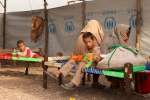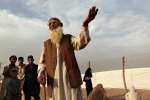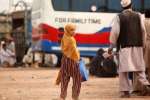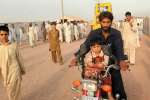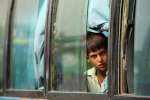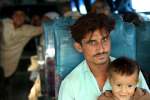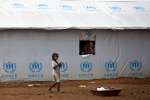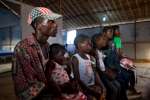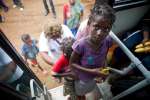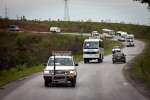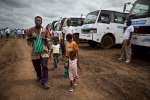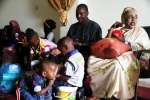- Text size
 |
|  |
|  |
| 
- Français
UNHCR resumes repatriation of Mauritanian refugees in Senegal
News Stories, 19 October 2010
ROSSO, Mauritania, October 19 (UNHCR) – The UN refugee agency has resumed its repatriation operation for Mauritanian refugees from Senegal following a 10-month break. A first group of 121 people were taken to the southern Mauritanian town of Rosso, crossing the River Senegal that marks the boundary between the two countries.
The group was warmly received in Rosso by a high-level government delegation, including the governor of the Trarza region and the Mauritanian Senate's Vice President. The 121 were later taken back to their villages of origin, mainly in the Aoudji and Madina Salam areas.
Voluntary repatriations from Senegal to Mauritania were suspended in December 2009 pending a tripartite meeting of the two countries with UNHCR. That meeting took place last July, allowing repatriations to resume now that the rainy season is over.
UNHCR is planning weekly convoys to transport home some 2,500 refugees by the end of this year. These are people who have been given clearance by the Mauritanian authorities to go back to the Trarza region of southern Mauritania.
The meeting also agreed to a strengthened Mauritanian government role in the repatriation process. Starting this week, the government has taken over the transportation of its returning citizens to their final destinations, the allocation of temporary shelters and construction kits to returnee families, as well as distributions of hot meals upon arrival. Previously, these activities were carried out by UNHCR while the authorities mainly handled the administrative formalities of refugee returns into the country.
"UNHCR welcomes Mauritania's greater involvement in the process and will continue to support its authorities in making returns sustainable," UNHCR spokesperson, Melissa Fleming, said in Geneva on Tuesday.
This assistance includes a cash grant, mosquito nets, blankets and provision of shelter kits to vulnerable families. UNHCR will also continue providing micro-credits to help returnees to become self-reliant, and maintain protection monitoring activities.
Refugees from Mauritania have been in Senegal for more than two decades. They are among the tens of thousands who fled when a longstanding border dispute between Mauritania and Senegal degenerated in April 1989. However, their voluntary return only became possible after the Mauritanian government called in 2007 on its citizens to return home from exile.
Monday's departure was the 80th convoy UNHCR has organized since launching the repatriation operation in January 2008. More than 19,000 Mauritanian refugees have returned home to date. There are still 21,300 Mauritanian refugees in Senegal and another 10,500 in Mali, of the initial 60,000 who fled to both countries in 1989.



